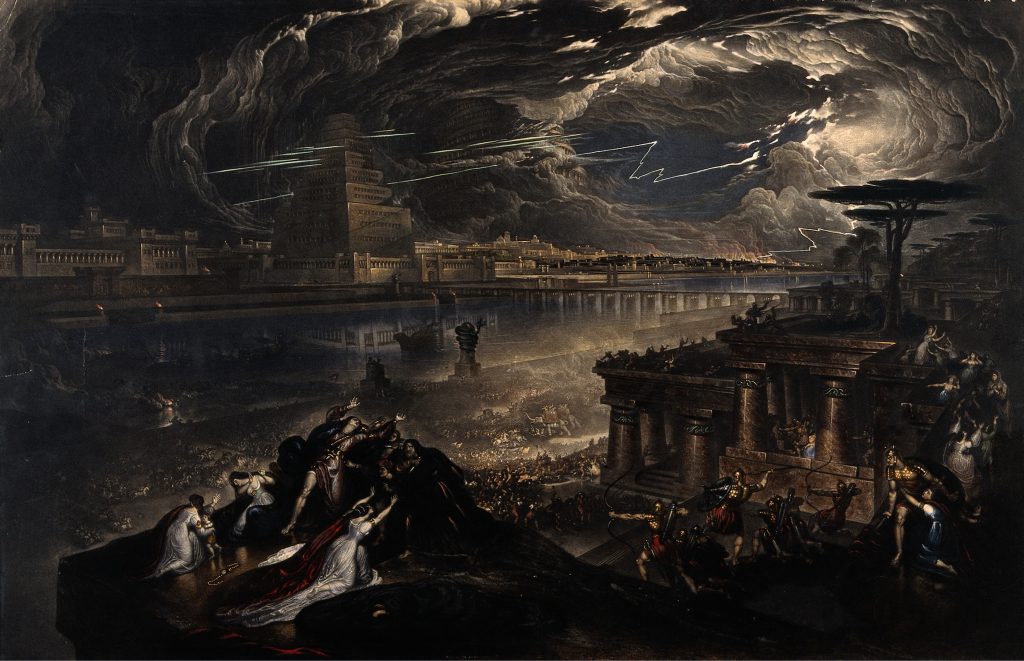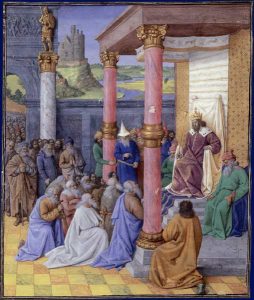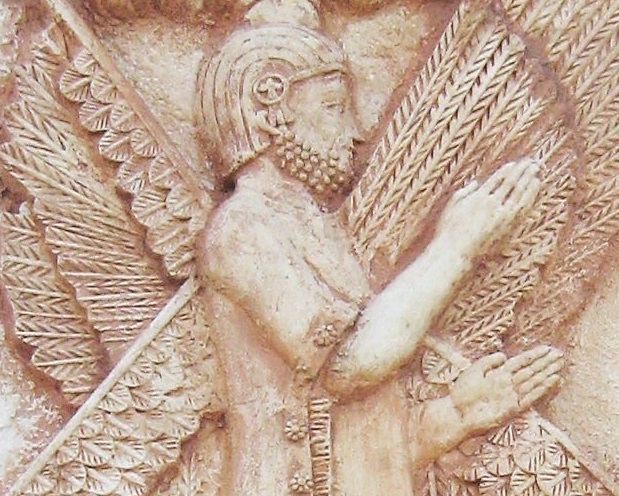
550 BC to 530 BC, Psalm 20: Fall of Babylon.
This site was first built in French (see www.147thgeneration.net). The English translation was mainly done using « google translation ». We have tried to correct the result of this translation to avoid interpretation errors. However, it is likely that there are unsatisfactory translations, do not hesitate to communicate them to us for correction.
(for that click on this paragraph)
Summary
This generation is from the years 550 BC to 530 BC
According to our count, this generation is the 20th generation associated with Psalm 20. It is in this Psalm 20 that we therefore find an illustration of the facts of this generation.
Nabonidus succeeds Nebuchadnezzar. He can not resist Cyrus, the Persian king who takes control of Babylon in 539 BC. Following his accession to power, Cyrus a year later allows the people of Israel exiled to Babylon to rebuild the Temple of Jerusalem. He returned to the exiled Jews the utensils of the Temple of the Lord, which Nebuchadnezzar had taken from Jerusalem and deposited in the Temple of his God.
The rebuilding of the Temple authorized and encouraged by Cyrus makes Zion and its sanctuary the cement of the people of Israel. He can regain hope in his future especially as these events reinforce the predictions of Jeremiah and Ezekiel who had predicted both the dramatic events related to the destruction of Jerusalem but also its reconstruction.
Talk
Cyrus
Nabonidus succeeds Nebuchadnezzar. He can not resist Cyrus, the Persian king who takes control of Babylon in 539 BC:
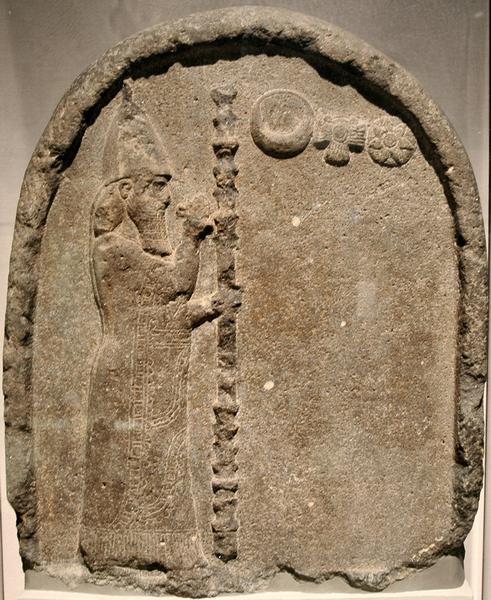
- In 539 BC[1], Cyrus attacked Babylon, where Nabonidus returned (who had previously settled in the oasis of Teima, in the northwest of the Arabian Peninsula, apparently to honor the moon god of the Arabs ) which offers only low resistance. Especially since a part of the Babylonian army passes to the Persian side! In the month of Tashrîtu (September October), when Cyrus fought against the army of Akkad at Upê (Opis) on the banks of the Tigris, the Akkadians (Babylonians) retreated. He looted and massacred people. On the fourteenth day, Sippar was taken without a fight, Nabonidus fled […]. On the sixteenth day Ugbaru, governor of Gutium, and the army of Cyrus entered Babylon without a fight. Then Nabonidus returned and was captured […]. On the thirteenth day of the month of Arashamnu (October November), Cyrus entered Babylon. The streets were filled before him. Peace reigned in the city as Cyrus greeted all Babylon.
Rebuild the Temple
Following his accession to power, Cyrus a year later allows the people of Israel exiled to Babylon to rebuild the Temple of Jerusalem:
- And[2] in the first year of Cyrus, the king of Persia, at the completion of the word of the Lord from the mouth of Jeremiah, the Lord aroused the Spirit of Cyrus, the king of Persia, and he issued a proclamation throughout his kingdom, and also in writing, saying:
- « So said Cyrus, the king of Persia, ‘All the kingdoms of the earth the Lord God of the heavens delivered to me, and He commanded me to build Him a House in Jerusalem, which is in Judea.
- Who is among you of all His people, may his God be with him, and he may ascend to Jerusalem, which is in Judea, and let him build the House of the Lord, God of Israel; He is the God Who is in Jerusalem.
- And whoever remains from all the places where he sojourns, the people of his place shall help him with silver and with gold and with possessions and with cattle, with the donation to the House of God, which is in Jerusalem.’
- And the heads of the families of Judah and Benjamin and the priests and the Levites arose, with all whom God inspired to ascend to build the House of the Lord, which is in Jerusalem.
- And all those around them strengthened their hands with vessels of silver, with gold, with possessions, with cattle, and with precious things, besides all that was donated.
- And King Cyrus took out all the vessels of the House of the Lord, which Nebuchadnezzar had taken out of Jerusalem and had placed them in the temple of his god.
The beginning of this quotation is also repeated in « II CHRONICLES »[3] and closes this book which is the last of the Hebrew Bible. Cyrus thus makes the connection between the kingdom of Judah before the Babylonian exile and after. The joining between a people of Israel tempted by idolatry and a people of Israel regenerated and faithful to their God.
The beginning of the rebuilding of the Temple (it will take several generations to really restore the Temple of Jerusalem) is a good illustration of the beginning of the psalm of this generation:

- For the conductor, a song of David.
- May the Lord answer you on a day of distress; may the name of the God of Jacob fortify you.
- May He send your aid from His sanctuary, and may He support you from Zion.
- May He remember all your meal offerings and may He accept your fat burnt offerings forever.
- May He give you as your heart [desires], and may He fulfill all your counsel.
Temple plans
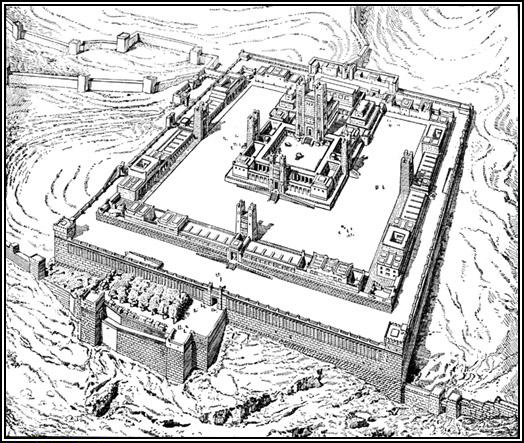
Previously, the Lord had given all the plans of the Temple to Ezekiel in a vision[4] so that it could be rebuilt according to the divine plans.
The actions of Cyrus in favor of the people of Israel correspond to a divine will as Isaiah recalls:
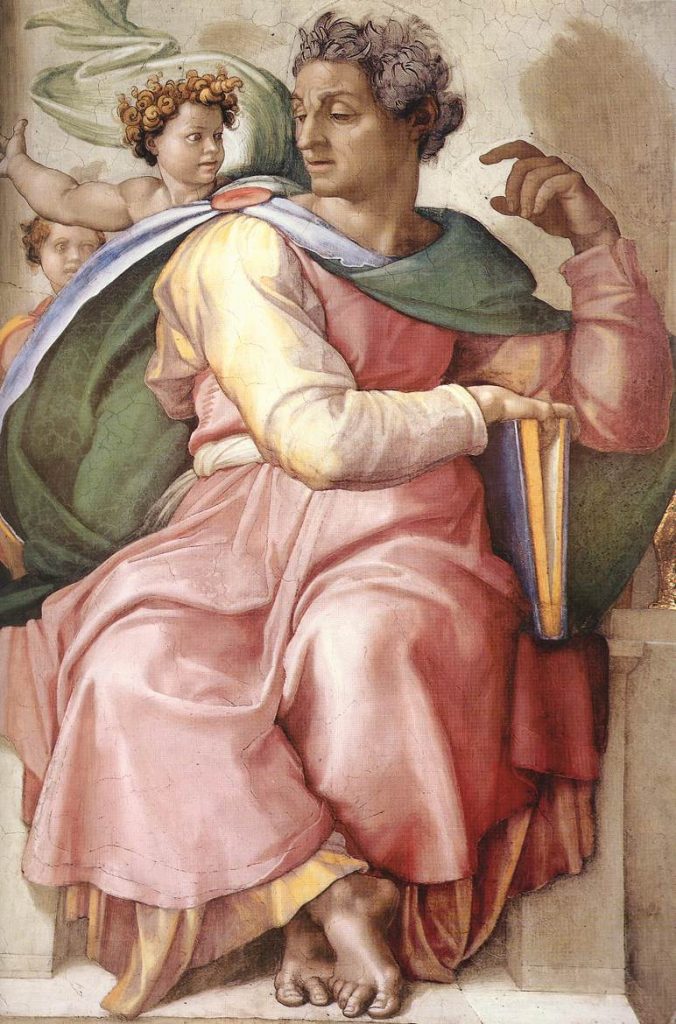
- So[5] said the Lord to His anointed one, to Cyrus, whose right hand I held, to flatten nations before him, and the loins of kings I will loosen, to open portals before him, and gates shall not be closed.
- I will go before you, and I will straighten out crooked paths; I will break portals of copper and cut off bars of iron.
- And I will give you treasures of darkness, and riches hidden in secret places, in order that you know that I am the Lord Who calls [you] by your name-the Holy One of Israel.
- For the sake of My servant Jacob, and Israel My chosen one, and I called to you by your name; I surnamed you, yet you have not known Me.
- I am the Lord, and there is no other; besides Me there is no God: I will strengthen you although you have not known Me.
- In order that they know from the shining of the sun and from the west that there is no one besides Me; I am the Lord and there is no other.
The gods of Babylon
Isaiah who also denounces the ineffectiveness of the gods of Babylon against the Lord God of Israel:
- Bel[6] squats; Nebo soils himself; their idols were to the beasts and to the cattle; what you carry is made a load, a burden for the weary.
- They soiled themselves, yea they squatted together, they could not deliver the burden, and they themselves have gone into captivity.
- Hearken to Me, the house of Jacob, and all the remnant of the house of Israel, who are borne from birth, carried from the womb.
- And until old age I am the same, and until you turn gray I will carry; I have made and I will bear and I will carry and deliver.
From the distress of exile, the decree of Cyrus revives hope among the people of Israel. The rebuilding of the Temple authorized and encouraged by Cyrus makes Zion and its sanctuary the cement of the people of Israel. He can regain hope in his future especially as these events reinforce the predictions of Jeremiah and Ezekiel who had predicted both the dramatic events related to the destruction of Jerusalem but also its reconstruction.
Divine power
In this perspective the announced fall of Babel (Babylon) reinforces the announcements of the prophets, especially those of Jeremiah, and thus strengthen the faith in the Lord:
- Babylon[7] is a golden cup in the Lord’s hand, it intoxicates all the earth; nations have drunk of her wine, therefore, nations are mad.
- Suddenly, Babylon has fallen and has been broken; wail over her, take balm for her pain, perhaps she may be healed.
- « We treated Babylon, but she was not cured. Leave her and let us go each one to his own land, for her judgment has touched the sky and has been raised to the heavens. »
- « The Lord has brought out our merits; come and let us tell in Zion the deed of the Lord our God. »
- Polish the arrows, fill the quivers; the Lord has aroused the desire of the kings of Media, for His aim is to destroy her, for the Lord’s vengeance is the vegeance of His Temple.
- On the walls of Babylon raise a standard, strengthen the watch, station sentries, prepare the ambushes, for the Lord both planned and did what He had spoken concerning the inhabitants of Babylon.
This passage parallels the continuation of Psalm 20:

- Let us sing praises for your salvation, and let us assemble in the name of our God; may the Lord fulfill all your requests.
- Now I know that the Lord saved His anointed; He answered him from His holy heavens; with the mighty acts of salvation from His right hand.
Thus faith in the Lord brings permanent and unbroken salvation to his people, while strength and arms only bring illusory and temporary success to his enemies. Thus, as Jeremiah proclaimed, God had used the military power of Babylon to punish his people:
- Therefore[8], Oholibah (name[9] given to Jerusalem in Ezekiel, while Samaria bears the name of Ohola), so said the Lord God: Behold I am arousing your lovers [to march] against you, those with whom your soul has become disgusted, and I shall bring them upon you from all around.
- The children of Babylon and all Chaldeans, Pekod, Shoa, and Koa, all the children of Assyria with them, handsome youths, governors and officers all of them, mighty men and summoned ones, all of them horse riders.
- And they will come upon you [with] weapons, chariots, and wheels, and with an assembly of peoples; an encompassing shield and a buckler, and a helmet they will place upon you all around; and I shall place judgment before them, and they will judge you with their judgments.
But this earthly army is only an instrument of divine vengeance, the power of which has no effect when God holds his hand. to his people:
- So[10] said the Lord of Hosts: The children of Israel and the children of Judah are plundered together, and all their captors have held onto them, they have refused to release them.
- Their Redeemer is mighty; the Lord of Hosts is His name, He shall surely plead their cause, in order to give rest to the earth and unrest to the inhabitants of Babylon.
- A sword is upon the Chaldeans, says the Lord, and upon the inhabitants of Babylon and upon her princes and upon her wise men.
- A sword is upon the imposters and they shall become foolish; a sword is upon her mighty men, and they shall become dismayed.
- A sword is upon his horses and upon his chariots and upon all the allies who are in her midst, and they shall become [like] women; a sword is upon her treasuries, and they shall be spoiled.
This illustrates the end of the psalm of this generation:

- These trust in chariots and these in horses, but we-we mention the name of the Lord our God.
- They kneel and fall, but we rise and gain strength.
- O Lord, save [us]; may the King answer us on the day we call.

[1] Based on « A History of the Hebrews (french title : « « Une histoire des Hébreux ») by Richard Lebeau which quotes « The Chronicle of Nabonidus (french title : « « La Chronique de Nabonide») » by George Roux.
[2] Ezra – Chapter 1, verses 1 to 7
[3] Divrei Hayamim II – II Chronicles – Chapter 36, verses 22 and following
[4] Yechezkel – Ezekiel – Chapters 40 to 43 (the following chapters explain the priesthood and the division of the land to the different tribes)
[5] Yeshayahu – Isaiah – Chapter 45, verses 1 to 6
[6] Yeshayahu – Isaiah – Chapter 44, verses 1 to 4 (Bel and Nebo are gods of Babylon)
[7] Yirmiyahu – Jeremiah – Chapter 51, verses 7 to 12
[8] Yechezkel – Ezekiel – Chapter 23, verses 22 to 24
[9] Yechezkel – Ezekiel – Chapter 23,
[10] Yirmiyahu – Jeremiah – Chapter 50, verses 33 to 37

